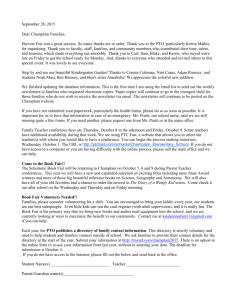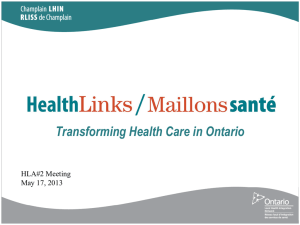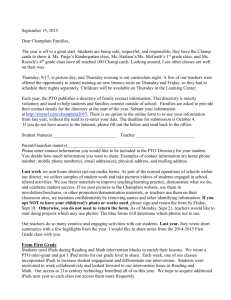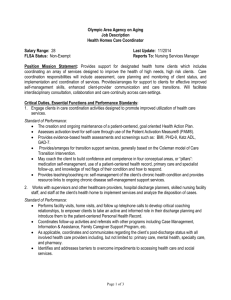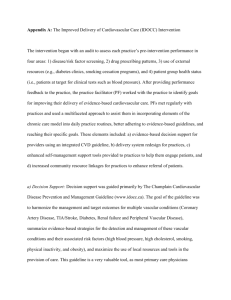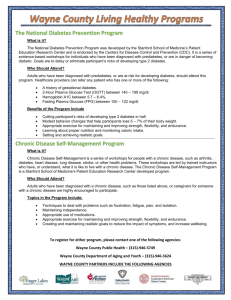Click Here to view the report!
advertisement
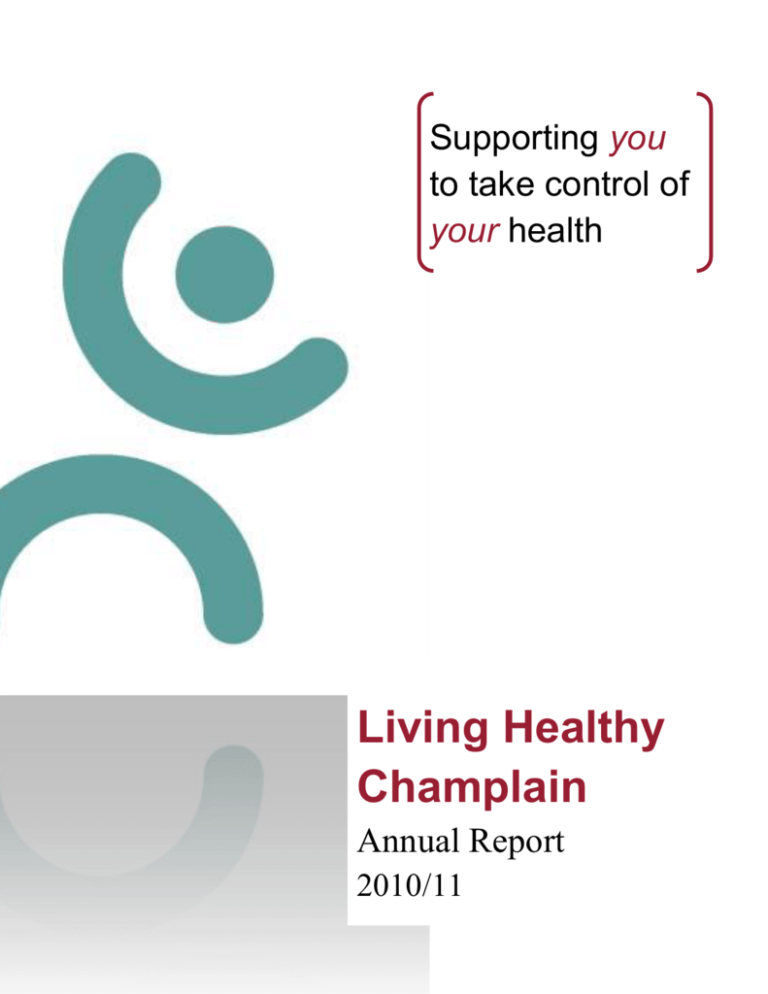
Supporting you to take control of your health Living Healthy Champlain Annual Report 2010/11 self manage ment support GOAL The overarching goal of Living Healthy Champlain is to provide people with chronic disease(s), their families and/or caregivers with self-management capacity to better manage their health. OBJECTIVE The objectives of Living Healthy Champlain are to improve and sustain patient self care and self-management support in the Champlain LHIN STRATEGIC DIRECTION Achieve objective through: 1) Facilitating co-ordination of and access to selfmanagement supports, programs and resources for people with chronic conditions; 2) Developing a culture of self-management support for patients, providers, and communities across the Champlain region; and 3) Evaluating reach, effect of strategies and investments. "I think the big thing of the program was discovering people that knew exactly how you felt." 1 MESSAGE FROM THE CHRONIC DISEASE SELF-MANAGEMENT STEERING COMMITTEE On behalf of the entire Living Healthy Champlain team, we would like to extend a very heartfelt thank you to all of our partners for helping us achieve our vision of providing people with chronic disease(s), their families and/or caregivers with self-management capacity to better manage their health. Each year we are increasingly happy to see health care providers working collaboratively towards a shared goal, and it is this compassion and dedication that drives us to continue facilitating learning and self care management. We are especially grateful to our funding partner, the Champlain LHIN, and our other collaborators, the Champlain CCAC, Élisabeth Bruyère Research Institute and Bruyère Continuing Care for all of their continued dedication in supporting chronic disease selfmanagement initiatives. With their prospective and long-term vision we have achieved great milestones in a short amount of time. It has been a wonderful working relationship which we look forward to continuing into the future. We continue to believe strongly in the principles of self management and the power that these techniques and skills can bring to individuals and to caregivers, and to the overall health of our region and healthcare system. We look forward to the next year of the program. Living Healthy Champlain encourages all to continue on the journey of incorporating selfmanagement into your life, and we will continue to practice and proclaim our motto: Supporting you to take control of your health! Debbie McGregor, Steering Committee Chair 2 … it was to me a plus to me to meet people…I always learn something from other people and how they’re coping, or little things, little nuggets that they have recommended that you think “Oh I haven’t thought of that”. INTRODUCTION In 2008 Dr. Clare Liddy, Dr. Sharon Johnston, and Sarah Mae Ives, Outreach Coordinator, completed a literature review and an environmental scan gaining health care providers’ perspective on Chronic Disease Self-Management Support in the Champlain LHIN. The results of this work, entitled Self-Management Support: A New Approach Still Anchored in an Old Model of Care, has been published in the January/February 2011 edition of the Canadian Journal of Public Health (available online at http://journal.cpha.ca/ index.php/cjph/issue/current). Following this work and with support and funding from the Champlain LHIN, Living Healthy Champlain was created! Living Healthy Champlain (LHC) is a coordinated effort between Élisabeth Bruyère Research Institute (ÉBRI), Bruyère Continuing Care (Bruyère) and the Champlain Community Care Access Centre (CCAC) with the Champlain Local Health Integration Network (LHIN) as funding partner. This two–year project funded by the Champlain LHIN through 2009/2010 and 2010/2011 has brought the partner organizations together to coordinate, promote and facilitate chronic What is self-management? disease self-management programs across the Champlain LHIN. In the Champlain region, there are over 400,000 individuals with a chronic disease1. The specific patient population which can benefit from this regional coordination includes adults living with one or more chronic health conditions including, but not limited to, diabetes, arthritis, chronic pain, neurological conditions, renal disease, respiratory conditions, cardiovascular disease and mental health illnesses. The program aims to reach a minimum of 1,000 participants per year. …the active participation of individuals in achieving their best health and wellness. This involves gaining the confidence, knowledge and skills to manage physical, social and emotional aspects of life in partnership with health care teams and community supports. Living Healthy Champlain provides information, training and resources for health service providers who are currently engaged in providing (ODS Self-Management Working Group, August 2010) chronic disease self-management (CDSM) programs, as well as those individuals and/or organizations that are interested and have the capacity to start programs. To date, What is self-management there are 31 organizations who are engaged at varying levels in support? providing Chronic Disease Self Management training programs … a range of organizational, for residents of Champlain. LHC supports these organizations by community and provider providing training and resources for health care professionals strategies to support the active engaging in self management strategies, helping to identify and participation of individuals in train volunteer peer leaders, and is developing volunteer support achieving their best health systems to provide ongoing leadership and training for volunteers. and wellness. (ODS Self-Management Working Group, August 2010) Partner Organizations & Volunteers Our partner organizations and the individuals are the key 1 3 Bains et al., 2007 ingredient in our recipe for success. They dedicate time, resources, space, and share knowledge and experience with LHC. They are the main source for insights on improvements to the program, next steps for self-management supports, linkages to community events and resources and many other facets as well. All of our training sessions are facilitated by leaders who volunteer four full days of time to complete these sessions. We thank both the leaders and the organizations that support them for their hard work and dedication. For a list of LHC’s partner organizations, please see Section 2. Self-Management Support LHC offers training in several different self-management support strategies, including: Stanford “Living a Healthy Life with Chronic Conditions” group-based workshop Motivational Interviewing Health Coaching Peer for Progress (Diabetes) Health Coaching Australia Behaviour Change & Modification Diabetes Conversation Maps ™ All of these programs encourage and nurture individuals to maintain their best possible health, harnessing their own skills and abilities and strengths. Sustainability is a frequently heard word amongst the LHC team, and this is kept in mind throughout all endeavours. To support sustainability, LHC holds recurrent Community Leadership meetings to bring together all trained volunteers and health professionals for feedback, knowledge transfer, networking and brainstorming. These meetings aim to reengage LHC partners and provide updates on self-management information and events. Three of these successful events were held in the 2010/11 year. LIVING HEALTHY CHAMPLAIN TEAM Dr. Sharon Johnston Principal Investigator 4 Dr. Clare Liddy Principal Investigator Erin Rae Regional Coordinator Hannah Irving Evaluation Coordinator Sarah Mae Ives Outreach Coordinator Sophie Des Rosiers Program Assistant Karina Mill Jr. Research Asst OBJECTIVE 1: FACILITATING CO-ORDINATION OF AND ACCESS TO SELF-MANAGEMENT SUPPORTS Geographical Reach The burgundy stars indicate where group (Stanford) workshops are currently being offered. There is a concentration of red stars in the Ottawa region, as workshop locations cannot be accurately placed on a map this size. From this depiction, LHC has identified a few areas to focus on in the coming months: “Because you are lost, you as a patient are lost, you don’t know how to go about it. “ 5 Eastern Counties: Hawkesbury, Casselman, Rockland Lanark: Almonte, Carleton Place, Arnprior Renfrew County: Deep River Project Deliverables The following chart provides a visual representation of our target goals, and the actual numbers achieved since project inception. The Providers column indicates our knowledge transfer activities. Participants are those who have taken group-based selfmanagement, Volunteers include all peer leaders trained in the group-based program. Finally, Workshops are what LHC identifies as group-based self-management programs. Project Targets & Totals for Groups 1100 1000 1000 900 800 700 768 600 600 600 Total 500 Target 400 300 200 62 100 80 57 85 0 Providers Participants Volunteers Workshops Some of the totals are below target, and this comes as no surprise to the team at LHC. The targets set were ambitious, and are still something to strive for. However, recognizing the population we are reaching can have complicated health problems, attrition rates (approximately 20%) are a common occurrence within workshops. Living Healthy Champlain will continue their goal of improving access to self-management and self-management supports for all “More determination…To residents of the Champlain LHIN. deal with the problem, whatever it took, exercising you know, whatever it took…I think that’s the greatest impact” 6 PARTICIPANT FEEDBACK 7 OBJECTIVE 2: DEVELOPING A CULTURE OF SELF- MANAGEMENT SUPPORT PARTNER ORGANIZATIONS Living Healthy Champlain has achieved such significant successes primarily due to the dedicated partnerships that have been formed. The following organizations have varying degrees of involvement with LHC, but are all highly valued as key to driving the culture of self-management support within the Champlain LHIN. Renfrew County Pembroke Regional Hospital Whitewater Bromley/ Rainbow Valley Community Health Centre Petawawa Centennial Family Health Centre Lanark County North Lanark Community Health Centre Ottawa West Queensway Carleton Hospital Carlington Community Health Centre Pinecrest Queensway Community Health Centre Westend Family Care Clinic West Carleton Family Health Team Ottawa Central Rideau Family Health Team Somerset West Community Health Centre Centretown Community Health Centre The Ottawa Hospital Academic Family Health Team South East Ottawa Community Health Centre The Ottawa Hospital, Riverside Campus, Nephrology Sandy Hill Community Health Centre Bruyère Academic Family Health Team Ottawa East Connexion Family Health Team 8 Wabano Centre for Aboriginal Health Eastern Counties Seaway Valley Community Health Centre Centre de Santé Communautaire de l’Estrie Williamsburg Non-Profit Housing Corporation Region-Wide The Arthritis Society Crohn’s and Colitis Foundation of Canada Stroke Survivors Association of Ottawa (Ottawa) VHA Health and Home Support (Ottawa) Community Support Coalition Canadian Diabetes Association University of Ottawa Heart Institute (Ottawa) Canadian Cancer Society Alzheimer Society Ottawa & Renfrew County Community Diabetes Education Program of Ottawa Independent Family Physicians Ottawa Regional Cancer Foundation 3C Foundation (Ottawa) Weight Management Clinic, The Ottawa Hospital TRAINING Living Healthy Champlain held four successful peer leader training sessions this year, resulting in a total of over 60 capable and eager volunteer leaders. We are very proud of all our leaders, and those who aren’t camera shy are featured below: Among these individuals there are leaders trained to deliver the “Living a Healthy Life with Chronic Conditions” self-management workshop from Stanford University in six different languages: Arabic, Chinese, English, French, Hindi, and Vietnamese. "I feel more in control of the things that aren't in my control.” 8 COMMUNICATION & MARKETING Living Healthy Champlain recognizes the importance of communication and consistent messaging in the effort to develop a culture of self-management in the Champlain LHIN. One of the main channels to communicate LHC’s work and the philosophy of self-management is via the website: www.livinghealthychamplain.ca. The Champlain CCAC has provided the use of the Champlain Healthline (www.champlainhealthline.ca) platform to develop the interactive site for LHC. The link to the highly resourced Healthline has allowed the LHC site more traffic and is also a mechanism in which to obtain several other community resources. The expertise behind the development of the LHC site has allowed for a registered users log-in site as well. This function enables our leaders a forum for discussion amongst themselves, and also provides them with pertinent registration information regarding their specific workshops. This partnership with the Champlain CCAC will continue into the next year, and LHC will continue to build and improve upon the current site to meet the needs of its users to the best of its ability. Getting the Word Out Speaking engagements are another method Living Healthy Champlain has used to spread the message about self-management, self-management support, and the ways in which LHC can endorse these initiatives. The following large events featured an LHC team member as a presenter: Crohn’s & Colitis & You Conference, April 2010, Ottawa ON Café Scientifique, May 2010, Ottawa ON Chronic Disease Management Strategic Planning Session, May 2010, Toronto ON Advancing Chronic Disease Prevention & Management, June 2010, Regina Saskatchewan RNAO Chronic Disease Management Institute, September 2010, Toronto ON Taking Charge of Our Health Conference, November 2010, Toronto ON Innovations in Health Expo, November 2010, Toronto ON Self-Management & Mental Health Working Group, November 2010, Toronto ON GUT Club, January 2011, Ottawa ON Art & Science of Outreach Facilitation, January 2011, Ottawa ON “More determination…to deal with the problem, whatever it took, exercising you know, whatever it took…I think that’s the greatest impact” 9 2 N D ANNUAL LIVING HEALTHY CHAMPLAIN CHRONIC DISEASE SELFMANAGEMENT CONFERENCE On March 30, 2010 over 150 health care professionals in the Champlain LHIN joined together to learn more about implementing self-management and selfmanagement support programs into their practice. Key note speakers included: Mike Hindmarsh, Hindsight Healthcare Strategies: “Building Self-Management Support Into Your Practice”, Janis Leiterman, VON Canada’s Director Chronic Disease Prevention: “Initiating Change in Health Systems” and Management and Amireh Ghorob, Project Director for the American Academy of Family Physician’s Peers for Progress: “Health Coaching and Panel Management”. In an attempt to meet the needs of the health care providers in the Champlain LHIN to the best of our ability, Living Healthy Champlain requested feedback from participants to improve upon the delivery of this conference. Below are some of the key findings and comments: What Further Support/Information is Needed? Support and funding for staff to attend training sessions Please think about including more mental health management of chronic disease & the roles of mental health professionals Feedback from persons with chronic conditions - what sort of support would be vital to them? Information on how to reframe my thinking from patient education to self-management support Long-term evaluation research 10 PARTICIPANT FEEDBACK 11 OBJECTIVE 3: EVALUATING REACH, EFFECT OF STRATEGIES AND INVESTMENTS A key component of the Living Healthy Champlain effort is to evaluate the impact that increased self-management support in our community and health care system has on the lives of Champlain LHIN residents. The evaluation team at the Élisabeth Bruyère Research Institute evaluates the Stanford “Living a Healthy Life with Chronic Conditions” workshops using questionnaires and focus groups. This work helps to guide the proper growth and development of self-management support programs in the region by understanding how the program helps, who it helps most, and who is not being reached or benefiting from the program. This evaluation will judge the long-term program effects on changes in health behaviour, health status, and health care utilization rates, as well as explore the role that patient confidence and motivation has on participants’ own health management. Since LHC’s inception in September 2009, 146 workshop attendees have participated in the evaluation by completing a health questionnaire at the beginning of each workshop session. Participants consent to have the same health questionnaire mailed to them 6 and 12 months after they participate in the workshop. The health questionnaire surveys participants’ perception of their health and quality of life, self-management behaviour, self-efficacy and health care utilization. The number of participants in the health questionnaire grows each month and, as more responses are received, a better understanding is gained about the workshop, including strengths and weaknesses and overall impact on participants and their health. Responses are grouped together to understand the effect on the group and at this time we are able to report on noteworthy trends in the data related to some participants’ self-reported health status, symptoms, coping and confidence to manage symptoms and health care utilization patterns. Demographics of Participant Population More than three-quarters of those who have chosen to participate in the evaluation of the Living a Healthy Life Workshops are female (78%) and a high proportion of this group (71%) are managing multiple chronic conditions. Nearly three-quarters (71%) of the evaluation participants have arthritis and/or a form of rheumatic disease, while nearly a third (32%) are living with diabetes. Other reported conditions include Asthma (15%), Heart Disease (15%), Emphysema and/or COPD (9%) and Cancers (6%). Chronic Disease Prevalence Participant Gender 78 % Female 12 22 % Male Cancer Emphysema/COPD Heart Disease Asthma Diabetes Arthritis Multiple Conditions 0% 20% 40% 60% 80% The self-management workshops are having an impact on participants’ reported symptoms and confidence to manage these symptoms. “I was hoping for a little more input from other sources, other than me having to go out and find these [resources]. But I think it did focus my attention on the whole process.” Currently 34 participants have completed questionnaires at all three time points: baseline, 6 months and 12 months after the workshop. Early trends amongst these individuals indicate that the workshops are leading to a decrease in the level of fatigue experienced by these participants, while the experience of pain appears to decrease soon after participation in the workshops and increase slightly overtime though remaining lower than before participation. Participants’ confidence to self-manage their symptoms, including fatigue and emotional distress, appears to be increasing following participation in the Living Healthy Workshops. (1=Not Confident, 10=Totally Confident) Confidence Confidence about doing things 6.5 Keep fatigue from interfering in your life 6 5.5 Keep pain from interfering with your life 5 Keep emotional distress from interfering with your life 4.5 4 Baseline 6 Months 12 Months Months Following Intervention Workshop participants are reporting changes to health services usage after completing the 6-week course. Visits in the last 6 Months Participants in the evaluation are also reporting changes to their use of health services following participation in the workshops. Out of the 34 individuals who have returned surveys at each time point, six individuals reported visiting the emergency department and the group Health Service Usage average number of visits for this 6 smaller group decreased over time 5 following the workshops. Overall, Visits to 4 Family the group average for physician visits 3 Physician also decreased following 2 participation in the workshops. Visits to 1 Emergency Room 0 Baseline 6 Months 12 Months Months Following Intervention 13 Rating (0=None, 10=Severe) While these preliminary findings from our participants who have filled out surveys up to one year after the workshop are interesting, we need to collect information on the experience of more workshop participants to understand if these trends are shared by the larger Severity of Symptoms group and an effect of the workshops 6 for most people or just for the small 5.5 group who have responded. We are actively trying to increase the number Pain 5 of individuals who participate in the Fatigue 4.5 evaluation of the workshops by better communicating the importance of their 4 Baseline 6 Months 12 Months participation and what the information provided is used for, such as sharing Months Following Intervention results back with the community through an annual report. In addition to the health questionnaire, the Evaluation Team at the ÉBRI hosted four focus groups in the fall of 2010. The team brought back original participants from workshops run in the fall of 2009, for a total of 21 participants. Focus group participants provided valuable, in-depth feedback on their experience with the Living Healthy Champlain program and its impact on their lives. Several common themes arose during the focus groups including: common barriers and facilitators to successfully self-managing chronic conditions; perceived positive effects of the workshops; positive features of working with a group of peers; and the importance of managing the expectations of participants. "…there are things available to us and not only doctors can help us, groups need to [as well]…” Focus Group participants identified barriers to managing their health in the way they wanted too, including symptoms such as pain and fatigue, lack of time, lack of transportation, financial needs and more. Participants also reported barriers specific to the medical system including lack of access to services, over prescribing medication, family physicians’ lack of knowledge of community resources. The Stanford self-management workshop is highly valued by participants, especially as it assisted them with goal setting, problem solving and coping. Participants in the focus groups also shared that the workshop had a strong positive impact on changing their attitudes and motivating change in exercise, eating habits and communication with caregivers and providers. The focus group participants indicated several positive features of group work including, the motivational capacity of the group, the opportunity to learn from others, a sense of connectedness and a safe space to disclose personal experiences of living with chronic conditions. “I’m starting to accept [the diagnosis] more than I did. It took a long time but I think this course helped me.” 14 “[ Participants in the focus group also brought to our attention that participants do not always have a clear understanding of what the course would deliver. This left some participants pleasantly surprised, and, in other cases, caused some frustration, speaking to a need to set the right expectations. Some participants indicated that they were not used to playing a key role in the management of their conditions, however, they indicated integrating this role into their lifestyles in order to better cope with their conditions. In addition to the Living Healthy evaluation, the evaluation team is concurrently working on emerging grants to further the reach of effective self-management support in the Champlain LHIN. The evaluation team has been awarded $90,000 to develop a national evaluation framework for chronic disease self-management programs in Canada. This framework will help provide the comparative information on outcomes of self-management support programs to understand their impact and for whom, and how it achieves this impact. More comparative information on outcomes across programs will better guide future development and implementation of these programs across the Champlain LHIN, the province and country. “…the first thing we did was talk about feelings and…I was amazed that we all had the same feelings of guilt, of depression, of frustration…it didn’t matter what the illness was. And that, to me, was really empowering” 15 PARTICIPANT FEEDBACK 16 FINANCIAL POSITION Living Healthy Champlain has been fortunate enough to have full funding endorsement from the Champlain LHIN. However, in order to achieve successes above and beyond the prescribed deliverables, LHC relies heavily on the in-kind contributions from partner organizations, and has also solicited external support from private funders. Further, in the last quarter of this fiscal year, the Ministry of Health and Long-Term Care provided funding through the Ontario Diabetes Strategy for self-management and self-management support in each LHIN. The chart below shows the division of funds by percentage: Funding Spread 3.58% 15.28% Champlain LHIN 20.17% 60.97% In-Kind Contributions Ministry Private The private funders are two pharmaceutical companies; sanofi aventis and Merck Canada. Each company provided unrestricted funds to help support the initiatives set forth by LHC. Living Healthy Champlain is keen on developing as many positive, supportive relationships as necessary to provide sustainability and resources to deliver services and opportunities to target audiences. LHC is also very cautious upon engagement of these partnerships and is sure to maintain the interests of the residents and health care providers of the Champlain LHIN throughout all activities. “This workshop helped me deal with the shock that doctors can’t always help you.” 17 STEERING COMMITTEE MEMBERSHIP Dr. Larry Chambers, President Élisabeth Bruyère Research Institute Karen Patzer, Senior Planner, Champlain LHIN Dr. Sharon Johnston, Élisabeth Bruyère Research Institute Dr. Clare Liddy, Élisabeth Bruyère Research Institute Debbie McGregor, Bruyère Academic Family Health Team - Chair Ilsa Eustice, Manager, Business and Community Development, Champlain CCAC Robin Lowry, Community Engagement Coordinator, Champlain CCAC Kelli Tonner, Manager, South East Ottawa CHC Melissa Cormier, Arthritis Society Lise Richard, Community Support Ottawa Jo Brunskill, Lay representative Nancy Stewart, Director, Complex Continuing Care, Bruyère Continuing Care Erin Rae, Regional Coordinator CDSM, Bruyère Continuing Care Hannah Irving, Evaluation Coordinator ÉBRI Sarah Mae Ives, Outreach Coordinator ÉBRI Sophie Des Rosiers, Program Assistant, Bruyère Continuing Care – Recorder "There is nothing for caregivers in the community. It [the workshop] was powerful." 18 PARTICIPANT FEEDBACK All quotes throughout the Annual report are from actual workshop participants in the Champlain LHIN. 19
